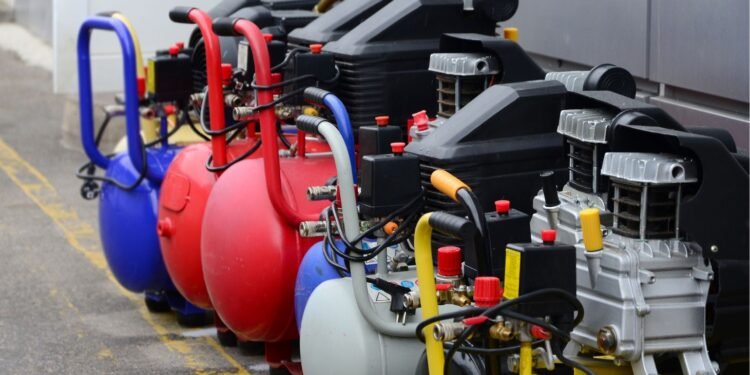When it comes to equipping your garage, one of the most versatile and essential tools you can invest in is an air compressor. Imagine your garage as a Swiss Army knife, with the air compressor being the main blade that powers a myriad of functions. From inflating tires to powering pneumatic tools, a reliable air compressor is the unsung hero of any well-equipped garage.
Importance of a Garage Air Compressor
A garage air compressor is like the heart of your home workshop, pumping life into various tasks. Whether you are a weekend warrior tackling DIY projects or a professional mechanic, the right air compressor can significantly enhance your productivity and efficiency. Think of it as the difference between using hand tools and power tools; while both get the job done, one does so with far more ease and precision.
Overview of Different Types and Uses
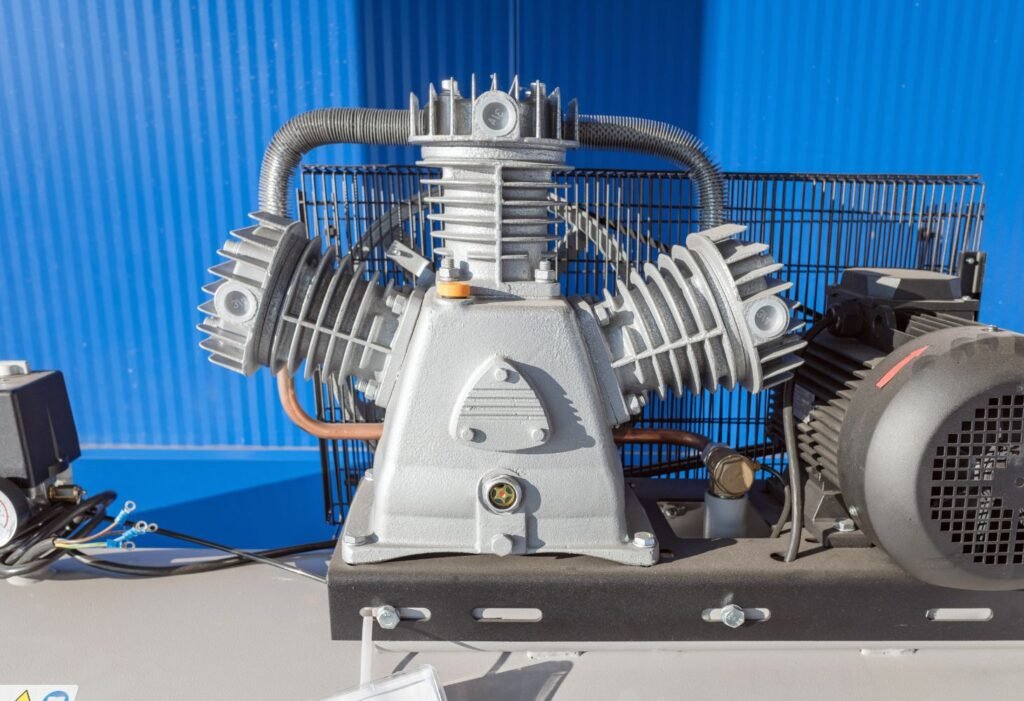
Air compressors come in several types, each tailored to specific needs. The most common types include:
- Pancake Compressors: These are compact and portable, ideal for light-duty tasks like inflating tires and powering nail guns.
- Hot Dog Compressors: Similar in function to pancake compressors but with a horizontal design, offering slightly more capacity.
- Twin-Stack Compressors: Featuring two air tanks, these provide more power and are suitable for medium-duty tasks.
- Wheelbarrow Compressors: Designed for heavy-duty use, these have large tanks and are often used in construction sites.
- Stationary Compressors: Large and powerful, these are fixed in place and used for extensive garage setups.
Choosing the right type depends on what you plan to use it for. For example, a pancake compressor might suffice for inflating car tires, but if you are using air tools frequently, a stationary compressor might be a better fit.
Choosing the Best Garage Air Compressor
Selecting the best air compressor for your garage involves several considerations. First, assess your needs. Are you primarily inflating tires, or do you need to power tools like impact wrenches, spray guns, and sanders?
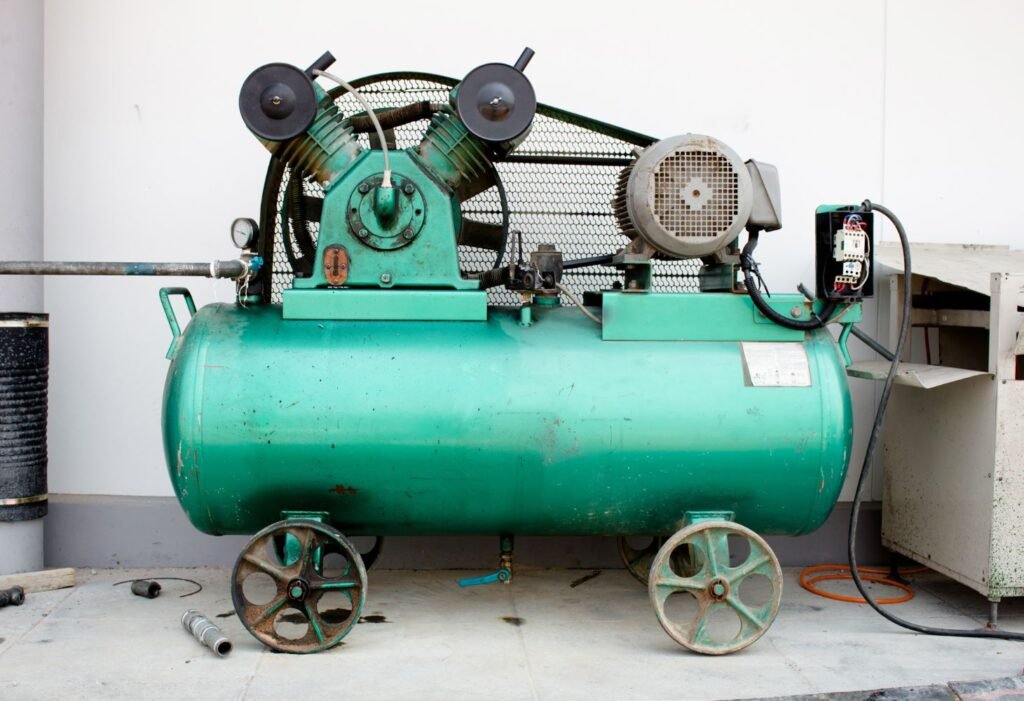
Factors to Consider:
- CFM and PSI Ratings: CFM (Cubic Feet per Minute) and PSI (Pounds per Square Inch) are crucial metrics. Higher CFM is necessary for tools that require more air, while PSI indicates the pressure the compressor can deliver.
- Tank Size: Larger tanks are better for continuous use, while smaller tanks are suitable for quick tasks.
- Portability: If you need to move the compressor around, portability is key. Otherwise, a stationary model might be more powerful and durable.
- Noise Level: Consider where you will be using the compressor. For home garages, quieter models are preferable.
- Power Source: Electric compressors are common for garages, but if you need a compressor in a remote location, a gas-powered one might be necessary.
Top Recommendations:
- DEWALT DWFP55126 Pancake Compressor: Ideal for light tasks, it offers 2.6 SCFM at 90 PSI with a 6-gallon tank.
- California Air Tools 10020C Ultra Quiet: This stationary model is perfect for home garages, boasting a 10-gallon tank and a mere 70 decibels of noise.
- Industrial Air IL1682066MN Twin Cylinder: For heavy-duty use, this twin-stack compressor provides 6.2 CFM at 40 PSI, making it suitable for demanding tools.
Garage Air Compressor for Tires
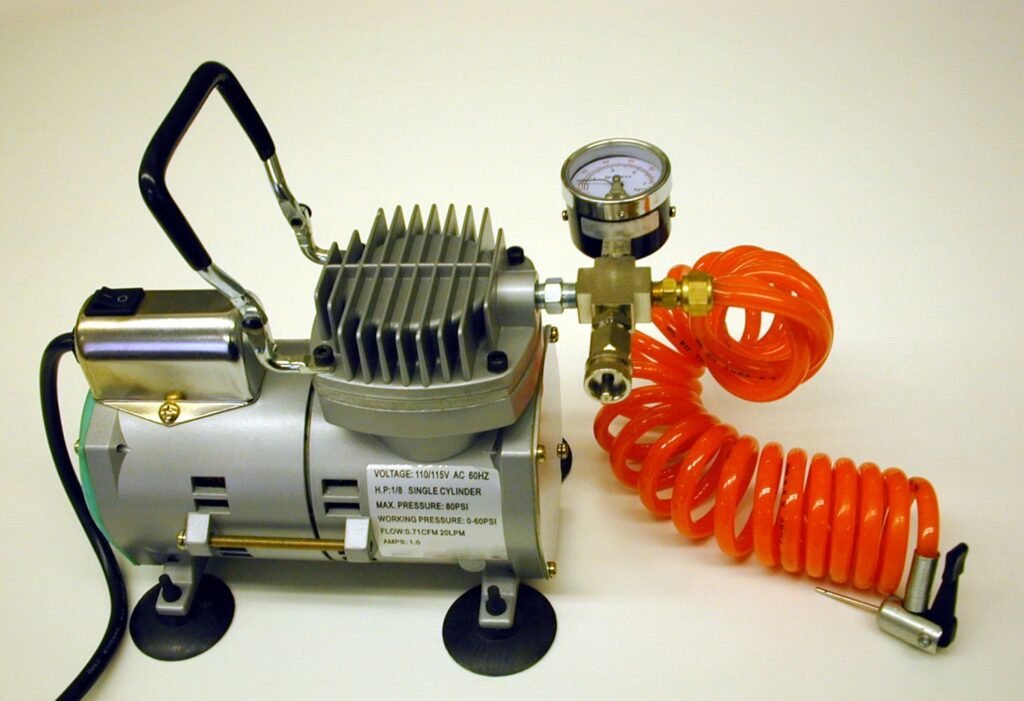
Imagine being able to check and inflate your car tires without a trip to the gas station. A dedicated air compressor for tire inflation is a game-changer. Proper tire maintenance not only ensures safety but also improves fuel efficiency and extends tire life.
Benefits of Having a Dedicated Air Compressor for Tire Inflation:
- Convenience: No more trips to the gas station. Inflate your tires anytime, ensuring they are always at the optimal pressure.
- Precision: Many air compressors come with built-in gauges for accurate inflation.
- Versatility: Besides car tires, you can also inflate bike tires, sports equipment, and even pool floats.
Top Models and Their Features:
- EPAuto 12V DC Portable Air Compressor: Compact and perfect for cars, it plugs into your vehicle’s cigarette lighter and can inflate up to 70 PSI.
- Viair 88P Portable Compressor: Capable of inflating tires up to 33 inches, it offers 1.47 CFM at 0 PSI and includes a 120 PSI gauge.
- Kensun AC/DC Swift Performance: Versatile with both AC and DC power options, it’s suitable for home use and on-the-go inflation.
Garage Air Compressor Wall Mount
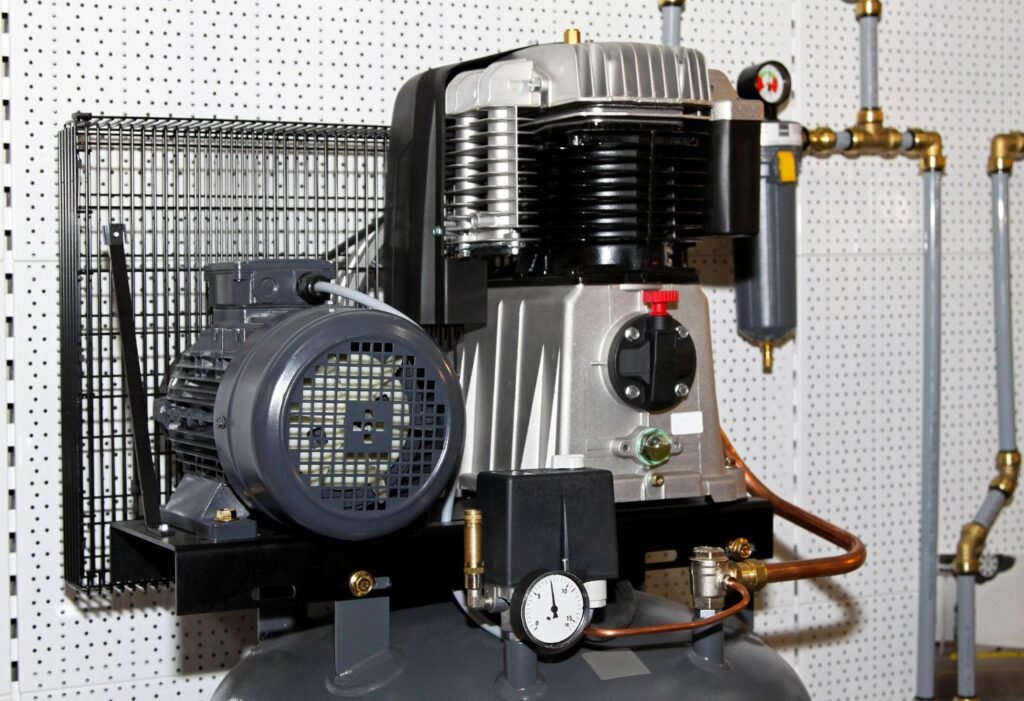
Maximizing space in your garage is essential, and a wall-mounted air compressor is a perfect solution. Picture your workspace uncluttered, with the compressor neatly mounted on the wall, ready for action at a moment’s notice.
Advantages of Wall-Mounted Compressors:
- Space Saving: Frees up floor space, making your garage more organized and accessible.
- Accessibility: Easy to use, with hoses and tools readily available.
- Efficiency: Reduces setup time since the compressor is always in place and ready to go.
Best Wall Mount Air Compressors Available:
- Maxair C5160V1-MAP: This industrial-grade model offers 5.0 HP, 16 CFM at 90 PSI, and a 60-gallon tank, perfect for heavy-duty tasks.
- RapidAir 90500 Compressed Air Piping System: Not a compressor itself but an excellent companion, allowing you to mount and organize your compressor setup efficiently.
- Stealth Ultra Quiet Air Compressor: With a noise level of only 65 decibels and a 20-gallon tank, it’s both powerful and unobtrusive.
Each of these options transforms your garage into a streamlined, efficient workspace, akin to a professional mechanic’s shop.
Garage Air Compressor System
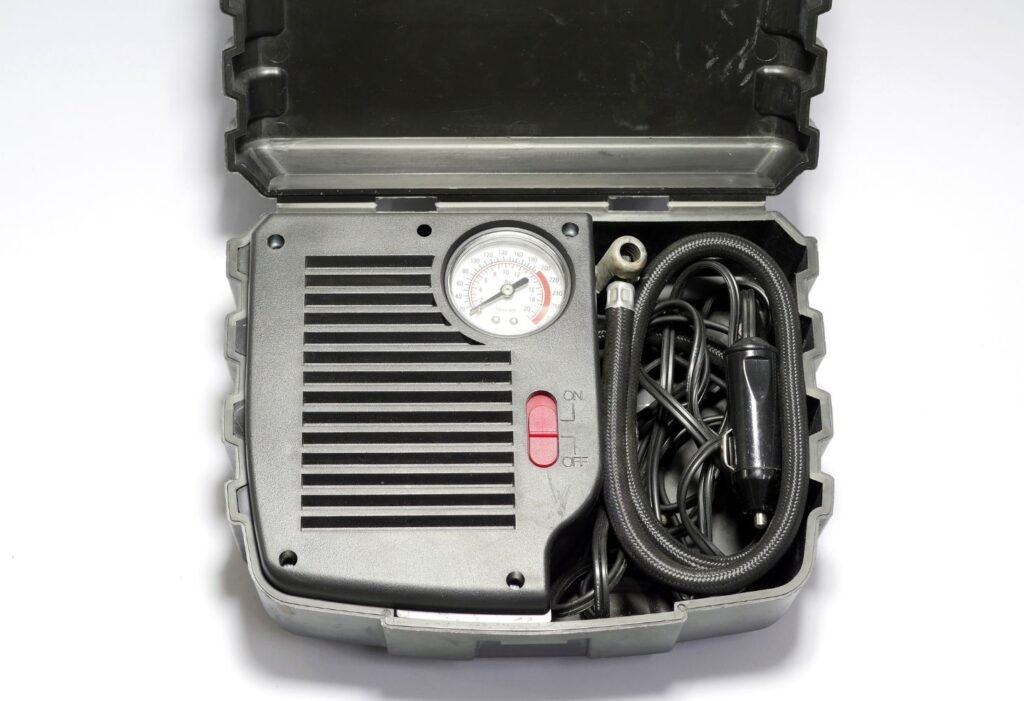
Imagine walking into a well-organized garage where every tool has its place, and your air compressor system is seamlessly integrated, ready for any task. A comprehensive garage air compressor system transforms your workspace into a versatile powerhouse, capable of inflating tires, powering pneumatic tools, and even painting. Just as a heart pumps life-giving blood through a body, an air compressor system energizes your garage, making every project more efficient and enjoyable.
The heart of this system is, of course, the air compressor itself. This device converts power into potential energy stored in pressurized air, which can then be used for a variety of applications. Key components of a comprehensive air compressor system include the compressor unit, air hoses, connectors, and air tools. Each piece plays a vital role in ensuring smooth operation and reliability.
When setting up a garage air compressor system, one must consider the space available and the types of tasks it will handle. Begin by choosing an appropriate location for the compressor, ensuring it’s easily accessible yet out of the way to avoid any workspace disruption. Much like placing a central heating unit in a house, the placement of your air compressor should optimize efficiency and convenience.
Garage Air Compressor Setup
Setting up a garage air compressor might seem daunting, but with a clear step-by-step guide, it becomes a manageable and even satisfying project. Think of it as assembling a new piece of furniture; each step builds upon the last to create a functional and sturdy final product.
First, select the right compressor for your needs. Consider the compressor’s CFM (cubic feet per minute) rating and PSI (pounds per square inch) capacity, ensuring it matches the requirements of your air tools. For example, a nail gun might require less power than a paint sprayer, so understanding these needs helps in choosing the right model.
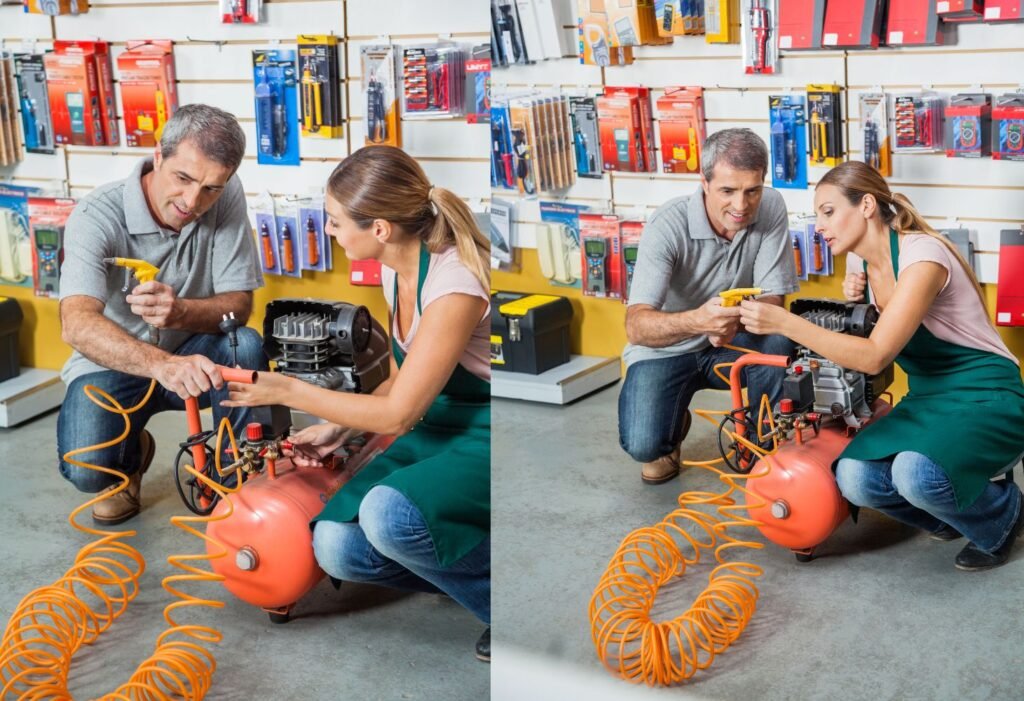
Once you have your compressor, find an optimal location in your garage. Place it on a flat, stable surface, away from dust and debris. If noise is a concern, consider installing it in a corner or a dedicated compressor shed to minimize sound disruption.
Connect the compressor to your power supply, making sure to adhere to all safety guidelines. Using a dedicated circuit can prevent electrical overloads, akin to ensuring your home entertainment system has enough power without tripping a breaker. Securely attach the air hose to the compressor’s outlet, and connect your air tools or accessories. This is like connecting the cables to your television and sound system; each connection must be tight and secure to ensure proper function.
For maintenance, regularly check the oil levels (if your compressor requires oil), clean or replace the air filters, and drain the tank to remove any built-up moisture. Think of it as changing the oil in your car or cleaning your home’s HVAC filters – regular upkeep ensures longevity and performance.
Best Garage Air Compressor
Choosing the best garage air compressor is like finding the perfect car. It needs to fit your lifestyle, meet your performance expectations, and offer reliability. Several criteria should guide your decision: power, capacity, portability, noise level, and price.
Power and capacity are paramount. A compressor with higher CFM and PSI ratings will handle more demanding tasks. For instance, the California Air Tools 10020C is a top choice for its ultra-quiet operation and powerful 2.0 HP motor, delivering up to 125 PSI. It’s akin to a high-performance sports car that combines power with smooth handling.
Portability is another crucial factor. If you need to move the compressor around your garage or take it to job sites, a portable model like the Makita MAC2400, known for its durability and compact design, might be the ideal choice. This is comparable to choosing a versatile SUV that can handle both city streets and rugged trails.
Noise level is often an overlooked aspect but crucial for a home garage setting. Compressors like the DeWalt DWFP55126, known for its low noise output, ensure that you can work without disturbing the entire household. Think of it as choosing a hybrid car for its quiet operation compared to a roaring muscle car.
Lastly, price is always a consideration. Balancing your budget with the features you need can be challenging but necessary. Models like the Porter-Cable C2002 offer a great blend of performance and affordability, much like finding a reliable sedan that fits within your financial plan.
What’s a good size air compressor for home use?
A 2- to 6-gallon air compressor is typically sufficient for most home uses, including inflating tires and running small air tools.
Why use an air compressor in the garage?
An air compressor is versatile, allowing you to inflate tires, power air tools, and even clean with compressed air, making it an invaluable tool for any garage.
What size air compressor do you need for a mechanic shop?
For a mechanic shop, a larger compressor with a capacity of 60-80 gallons and a higher CFM (Cubic Feet per Minute) rating is ideal to handle multiple tools simultaneously.
Can you keep an air compressor in a cold garage?
Yes, but ensure it’s well-maintained. Cold temperatures can affect performance, so it’s important to regularly drain moisture from the tank and use a synthetic oil that performs well in low temperatures.
Conclusion
In summary, setting up a comprehensive garage air compressor system involves careful planning and consideration of various factors to ensure optimal performance and convenience. By following a systematic approach to setup and maintenance, and by choosing a model that fits your specific needs, you can transform your garage into a versatile and efficient workspace. Whether you’re a DIY enthusiast or a professional, investing in the right air compressor system is akin to upgrading from a basic toolkit to a state-of-the-art workshop.

